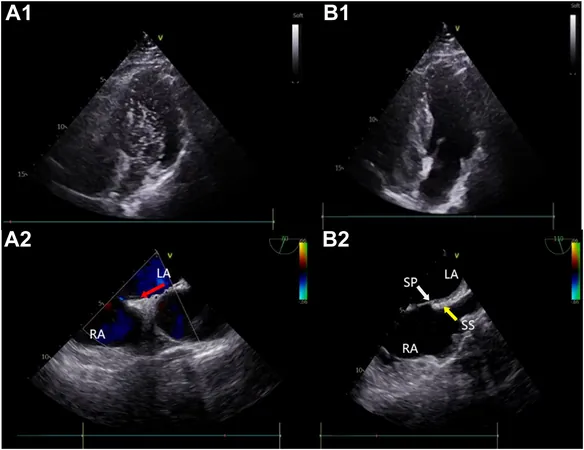
Revolutionary Study Shows Cryoablation as a Game-Changer for Cardiac Repair in Atrial Fibrillation Patients
2024-11-26
Author: Wei
Introduction
In a groundbreaking new study published in the journal Heart Rhythm, researchers have unveiled that cryoablation is not only safe but also extremely effective for closing congenital patent foramen ovale (PFO) in patients suffering from atrial fibrillation (AF) during pulmonary vein isolation (PVI) procedures.
Understanding PFO and Its Implications
PFO, a small and often unnoticed hole in the heart, affects between 20% to 34% of adults and is linked to a range of serious health issues, including cryptogenic strokes, transient ischemic attacks (TIAs), migraines, and decompression sickness. Traditionally, closing this hole involves inserting a metal device, which can lead to complications such as infections, arrhythmias, and even device displacement.
Research Innovation
However, this new research proposes an innovative alternative—using cryoablation, which achieves closure through the application of extreme cold, thus avoiding the risks associated with permanent devices.
Study Details
Dr. Jiang Deng and Dr. EnRun Wang, co-lead investigators from Chongqing Medical University, explained that the study aimed to assess the efficacy of cryoablation to induce PFO closure without resorting to the usual device implantation. They believe this method could potentially mimic natural healing processes, reducing complications and allowing future access to the heart for additional treatments.
Patient Group and Results
The study involved 22 patients, all of whom had drug-resistant paroxysmal or short-term persistent AF along with PFO. They were divided into two groups: one receiving the standard PVI with cryoablation and the other undergoing only standard PVI. The results were promising, revealing that those who had the cryoablation procedure exhibited a significantly higher success rate in achieving PFO closure. Crucially, neither group saw a rise in adverse events nor an increase in stroke or recurrence of AF.
Potential Impact and Future Directions
In addition to emerging as a safer alternative, cryoablation for PFO closure could revolutionize the management of patients with concurrent AF, especially those requiring further interventions down the line. Experts like Dr. Nir Flint and Dr. Eyal Ben-Assa highlight the potential of this technique to offer a "device-free" solution to PFO closure, which not only minimizes risks associated with artificial devices but also supports natural healing.
Conclusion
As we stand on the brink of new cardiac treatment paradigms, this pioneering research on cryoablation for PFO management may just reshape the field and provide new hope for patients struggling with these complex heart conditions. More extensive studies are warranted to further solidify the findings and explore the full potential of this innovative approach.



 Brasil (PT)
Brasil (PT)
 Canada (EN)
Canada (EN)
 Chile (ES)
Chile (ES)
 España (ES)
España (ES)
 France (FR)
France (FR)
 Hong Kong (EN)
Hong Kong (EN)
 Italia (IT)
Italia (IT)
 日本 (JA)
日本 (JA)
 Magyarország (HU)
Magyarország (HU)
 Norge (NO)
Norge (NO)
 Polska (PL)
Polska (PL)
 Schweiz (DE)
Schweiz (DE)
 Singapore (EN)
Singapore (EN)
 Sverige (SV)
Sverige (SV)
 Suomi (FI)
Suomi (FI)
 Türkiye (TR)
Türkiye (TR)